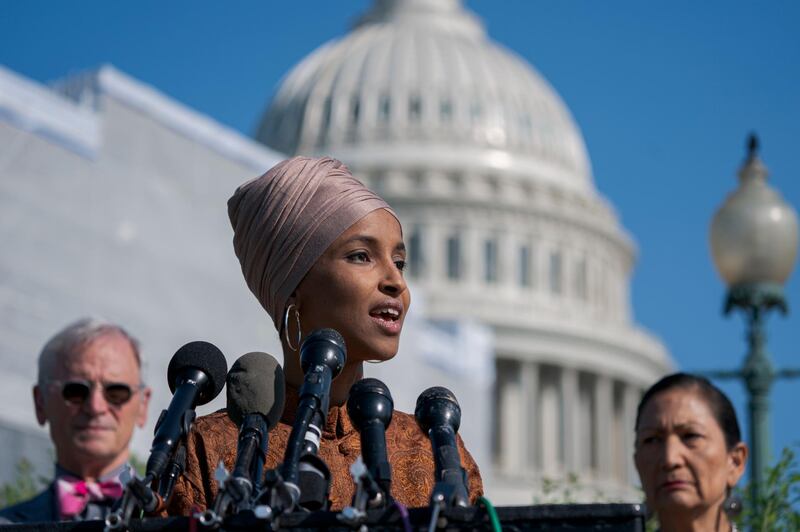At a recent public event in Washington DC, Ilhan Omar, a US Congresswoman from Minnesota, had a harsh rebuttal to a question about female genital mutilation. The questioner wanted Ms Omar to condemn FGM.
Ms Omar, quite appropriately, pointed out that implicit in the question was an assumption about her record on the issue, and about Muslims in public life more generally. Beyond FGM, there are a number of questions that should be asked about what assumptions lie behind our questions to visibly Muslim westerners – not only in public life, but more generally in our society, too.
Ms Omar is not exaggerating the absurdity and offensiveness of this line of questioning. As a visibly Muslim woman of colour, she gets this line of question more often than most.
A few weeks after the 9/11 attacks in the United States, I was beginning a new job at a university in the United Kingdom, and being shown around the campus with other new recruits by our manager. The subject of the attacks came up, and suddenly, I – and no one else – was asked by our manager, “What do you think about the attacks?” As a Briton of mixed English and Arab heritages, it seems, I somehow was expected to have a unique response, hence why my other colleagues were not asked the same question.
Before I could even answer the question in some fashion, the manager volunteered her own answer: “Well, I think it is absolutely awful.” I have to say, the manager in question was very friendly and cordial with me throughout my time at that university – and I suspect she didn’t mean any offence by the question. However, implicit in her voluntary answer to her own question was an assumption that I wouldn’t automatically feel the same as she would about this atrocity. Why? Because of the presumptions around my own background.
When Ms Omar responded in the forthright way she did, rejecting the presuppositions and assumptions around the question itself, numerous Muslim westerners online expressed support, declaring their own frustration with having to continuously express condemnation about a variety of different atrocities carried out in the name of Muslims or Islam. It's hard not to feel sympathy with their point of view.
When David Duke, the former grand wizard of the Ku Klux Klan, expresses racist sentiments on social media, we do not expect all white Americans to condemn him, even though he is claiming to speak in their name. When Israeli forces engage in abuses of the people of Palestine, we do not expect Jews everywhere to denounce them, even though Israel claims to be the state of the Jewish people. When Buddhists carry out atrocities in Myanmar against the Rohingya Muslim population, we do not insist that Buddhists worldwide declare how appalling they find such treatment, even though the atrocities are being carried out in the name of defending Buddhists. Nor should we engage in such collective guilt-shaming. Yet, it seems when it comes to Muslims, that is not always upheld as a principle.
In the aftermath of 9/11 in the United States, the July 7 bombings in the UK, ISIS outrages in the past few years, there were continuous calls for Muslims, writ large, to condemn terrorism. Many Muslims did precisely that, because they felt a moral imperative out of disgust with such attacks and incidents.
If Muslims feel moved to do so, their choice should be respected – but they should not be expected to. They are not responsible for the atrocities of terrorists – the terrorists and their supporters are. By insisting that Muslims generally have a responsibility in that regard, we are clearly and obviously connecting them to these terrorists or abusers of other kinds, without any evidence to suggest such. Moreover, we also say something implicitly about those who do not engage in these public declarations of differentiation from terrorists and criminals – because, as the argument goes, silence is “consent”.
We do not make these sorts of demands of other groups, and nor should we. In much of our liberal discourse today, we bemoan the damaging effects of identity politics, in terms of how we generalise individual members of minority groups in society, and insist that they be engaged with via particular “boxes”. However, the mainstream often forces those minorities to operate fully in society only via such identity politics – and expecting them to condemn everything under the sun that is committed by a tiny percentage of members of their wider ethnic or religious groups is just one example.
Ms Omar’s intervention in this regard last week was a deeply welcome one – and we should all take heed.
Dr HA Hellyer is senior associate fellow at the Royal United Services Institute and the Carnegie Endowment for International Peace @hahellyer





